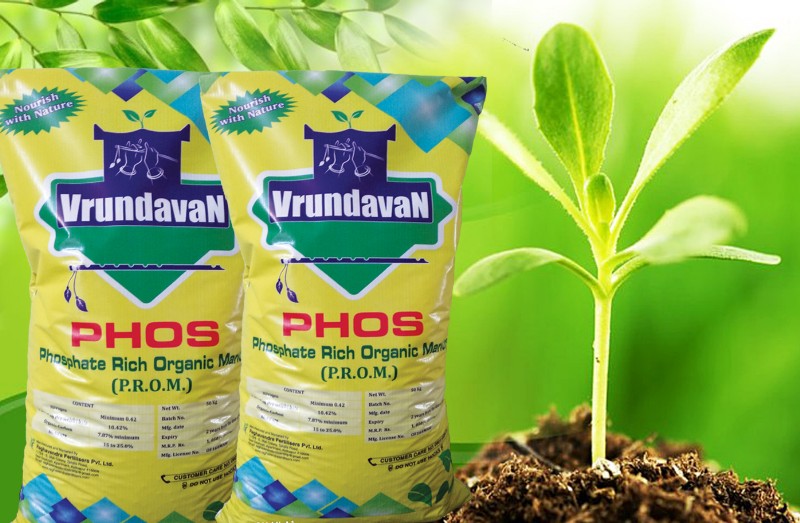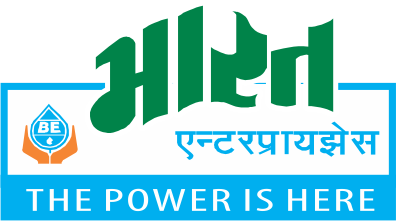Vrundawan Potash

Product Name
VRUNDAVAN PHOS (P.R.O.M.)
Phosphate Rich Organic Manure
Product Weight
50 KgSelling Rate (M.R.P.)
Rs. 1050.00 Available with “O Form” of F.C.O.
Product description
(in brief)
Phosphate Rich Organic Manure could be a Direct replacement to Chemical Phosphate Fertilizers. Application: 1 bag instead of 1 bag of DAP or 1 bag instead of 2 bags of Single Super Phosphate
Product description
(in detail)
ROLE OF PHOSPHOROUS
o Symbol: P
o Available to Plant as Ortho Phosphate Ion (HPO4 and H2PO4)
Phosphate Functions
o In photosynthesis and respiration Phosphorus plays major role in energy storage
o “Building Block” of plant
o Important element of RNA-DNA of plant cells
o Important element of ADP and ATP molecules of plant cell
o ADP and ATP molecules transfer Energy for biochemical processes
o Seeds have the highest concentration of Phosphorous in a mature plant
o Phosphorus is required in large quantity in young cells, such as shoots and root tips, where metabolism is high and cell division is fast
o Phosphorous aids the root development, flower initiation, seed and fruit development
o Maintains balanced intake of Nitrogen and Potash
o Phosphorus is involved in formation of oils, sugar, starch etc.
o Yield deciding factor
Chemical Phosphate Fertilizers
o Di-ammonium Phosphate (D.A.P.)
o Single Super Phosphate (S.S.P.)
PHOSPHATE FIXATION PROBLEM
o Fixation means non-availability of given Phosphate
o Our soils contain salts like
Calcium
Aluminum
Iron
Manganese
o These salts unite with Phosphate and become insoluble in water
o This insoluble phosphate is immovable and is not available to plants Organic matters in the soil is very less this adds to increasing fixation
o Fixation Percentage in Chemical Fertilizers: 60 -85 %
o In soils with less than 6 pH and more than 7 pH more fixation
o High fixation in soils with clay contents
o Very high fixation in soil with low organic matter
o Micronutrients such as zinc, magnesium and boron are kept away from the plant
o Productivity is slowly going down
o The fertility of the soil is decreasing
Phosphorus Deficiency Symptoms
o Because Phosphorus is needed in large quantity during the early stage of the cell division, the initial overall symptom is slow, weak growth and less germination
o Dark to blue, green coloration of older leaves of the plant. Under severe deficiency purpling of leaves and stem may appear
o Deficiency of Phosphorous can cause delayed maturity and poor seed and fruit development
o Low yield Solutions to overcome the Phosphate Fixation and practical difficulties:
o Use of F.Y.M. or Green Manure or Maximum Organic matter
o Good quality of F.Y.M. or Compost is not easily available
o Farmers are reluctant use organic matter
o The cost goes very high
VRUNDAVAN PHOS could be a cost effective alternative to chemical phosphatee fertilizers
o Phosphate Rich Organic Manure
o Also known as Phosphocompost
o It is a source of Phosphorous in neutral and alkaline soils
o It involves the incorporation of rock Phosphate ensuring the composting of organic matter
o During composting, a lot of organic acids and Humic substances are produced which results in increases microbial activity
o This increased microbial activity brings about the solublization and accounts for 75 % to 90 % Phosphorous solubalized.
o It contains Organic Carbon up to 10 %, so it can be Soil Rejuvenator
o Phosphate source for P.R.O.M. production is indigenous Rock Phosphate. Rock phosphate contains Silica in large proportion along with Phosphate. Silica is proving to be an important element for all crops.
Technical Action
o Multiple molecules are converted into Mono Calcium Phosphate form by the action of our cultures
o Phosphorus from mono calcium phosphate is released
o Phosphate which is already in the unavailable form in the soil is also slowly released and gets converted into Phospho-Humate complex
o Microbial activity of the soil is steadily enhanced
o About 30 % Phosphorus, 4 -6 % Silica and 4 to 6 % Calcium is made available immediately and remaining as and when required
Advantages of use
o Phosphate is yield deciding factor and phosphate is made available to plant
o About 15 to 30 % yield increase
o Plant become strong, healthy, free from pest and disease
o Stimulates plant to uptake Ca and Si from soil
o Provides Micronutrients like Zn, Mg and Cu
o Rich with Micronutrient Fe
o Enhanced microbial activity so Soil become live and porous
NOTE
THIS DATA SHEET IS FOR REFERENCE PURPOSE ONLY AND RFPL RESERVES THE RIGHT FOR ITS PUBLIC DISPLAY AND CIRCULATION. RFPL SHALL NOT BE HELD RESPONSIBLE FOR ANY CONSEQUENTIAL EFFECTS, IF THE DETAILS FURNISHED ABOVE ARE PUBLISHED WITHOUT IT’S PROPER PERMISSION AND AUTHORISATION.

